#pro writer freedom
Explore tagged Tumblr posts
Text
i am actually so tired of the way westerners treat eastern europeans
#fair warning for. a very very long ramble and rant in the tags. apologies#westerner or russian. no other option#westerner because the only thought they ever have is 'but they had universal housing so if you oppose ussr you oppose that'#(which is stupid becuse you can believe in that WITHOUT WANTING LIKE 6 COUNTRIES TO BE FORCED TO BE RULED OVER BY RUSSIA)#(SORRY FOR WANTING TO LIVE IN MY COUNTRY WITH MY HISTORY AND MY CULTURE AND NOT RUSSIA!!) (poland was a sattelite state but GOD)#or russian because they have a victim complex and are convinced that they deserve to rule over the entire damn world#'well you had universal housing so you had it easy' right yeah. okay. forget about like. everything else that happened#to eastern europeans during that time#forget about the things that are STILL issues all these years later not only in poland but like the more eastern countries too#its not about. the fact that the houses 'didnt have 3 bedrooms and a jacuzzi' in them. you DUMB SACK OF SHIT#god sorry. sorry. i also know so very little but like god damn i fucking live here. i didnt sit thru all that modern history#for some dumbfuck to say that 'ohhh only rich and american middle class people are happy the ussr was dissolved'#'oooh the dissolving of the ussr was illegal and the countries within it actually liked being there'#im just so fucking tired man i need to. i need to start killing people#and this is all not to mention that theyll say this stupid shit and then deny eastern europeans the things they actually did that were good#FUCK french people for trying to claim maria skłodowska. fuck americans for trying to claim the witcher as their own fantasy world#fuck the way the west is allowed to claim and destroy eastern european culture without any consequence because we dont matter enough#vaguely related but ill throw this in here since anyone finding it is unlikely and im scared of having this opinion#i think one underappreciated aspect of DE (which might be underappreciated because its not actually there and im stupid)#is that its pro-communist while still also giving some criticism to how it was handled and acknowledging that its still not perfect#which makes the writers much better communists than any self-proclaimed one ive ever met in my life who just worships the idea#perhaps its because the writers of the game were not white upper middle-class americans living in the suburbs. among other things#idk de is a game for people far smarter than me and i only played it once and im sure anyone who played it well can clock me as a bad perso#horrible horrible person even which is why im scared of mentioning it. but its an interesting thing. to me#the main thing is that im just not. im not far left enough i suppose. i agree communism in theory is a great idea. as far as i know it#(which isnt very far)#but chances of implementing it correctly in a way that doesnt take away from peoples happiness in other areas is. low. very low#i wrote a short essay about how utopias are inherently contradictory ideas once it wasnt very deep or good but like#you cant have universal happiness without restricting certain freedoms. and when those freedoms are resticted not everyone#will be happy. and then theyre unhappy they will have to be somehow removed or ignored
16 notes
·
View notes
Text
Big difference for everyone who write here and on tumblr. (Big post in drafts but I also want to say this separately)
Tumblr has a tag filter system and flagging. So people evading tag bans are a thing. This is annoying but I understand.
On ao3.
YOU NEED TO TAG PROPERLY! IT IS NOT AN OPTION THERE!
Now I do understand not wanting to spoil the story. But you don't have to tag every single little thing.
However
You do need to tag kinks, more extreme forms of violence, and 'morally reprehensible' content.
There is no algorithm on ao3. You will not be banned or flagged for using racy tags. Now people can still report your fic, but the mod team tends to be pretty fair. You need to give a reason for reporting and if they lie about it you will likely be fine.
BUT YOU WILL BE TAKEN DOWN FOR NOT USING TAGS!
On ao3 it is the opposite of a lot of social medias. If you don't tag the more extreme stuff, than people can and will and probably should report your fic for not including it.
Because ao3 is a place where anything goes. As long as it's tagged so people who don't want to see it don't have to. The tags are both a way to search for what you want and a way to filter what you don't. That's one of the biggest features of the website. One of the best search systems in terms of fanfiction websites.
On ao3 anyone can publish anything no matter what it is, as long as they tag it correctly. (I'm pretty sure there are hatespeech rules as well but that's not what we are talking about)
And if you tag it dead dove, that means people need to pay attention to the tags. Which means you must tag even more carefully and fully because you are calling attention to your tags.
Do not use replacement speech for these things. If you're embarrassed that you wrote it you can orphan it. Or use a different account you set up for your kink/violent/ other content. It's not as normal on ao3 but it's an option.
No not use 1 3 4 ! @ # $ + and such to replace letters on ao3 if you are tagging things. Because the filters won't recognize it and block it for people who don't want to see it. And people can report you for that.
There is no algorithm on ao3.
There is no censorship program on ao3 either.
So please tag. So both you can find your audience, and so the rest can avoid it.
#shine post#tag your fic#ao3 writer#ao3 tags#ao3 needs tags#tagging#ao3 discourse#tumblr tags#this isnt a matter of anti or pro its a matter of safety and freedom to write#writer on ao3#TAG THINGS#please reblog#writers on tumblr
12 notes
·
View notes
Text

Write anything in Ellipsus.
The internet’s a little dystopian right now, and writers (rightfully) have concerns about how their writing might be monitored, scraped, or censored by the tools they use.
That’s why we’ve clarified our privacy policy and terms of service—so you know exactly where we stand on privacy, creative freedom, and writer-first (and pro-transformative works ❤️) policies.
Nothing’s materially changed, but the language is clearer. Here’s the short version:
Your data is yours. We won’t access it, sell it, or misuse it. Ever.
Write what you want. We’re a writing tool, not a gatekeeper. We don’t host, don’t police, and we strongly believe in creative freedom.
You’ll always be in the loop. If anything big changes or we need to adapt to better safeguard and serve our writers, you’ll hear from us first.
We want Ellipsus to be a safe, confident home for your work—no matter what you’re writing.
Want to hear about the latest updates as they happen? Join our Discord to follow announcements and share your feedback.
- the Ellipsus Team XO
#writeblr#writers on tumblr#writing#ellipsus#fiction#collaborative writing#fanfic#fanfiction#writing memes#collaboration
998 notes
·
View notes
Text
We all know about the DDOS attacks on AO3 as it is still down. So it is very important we talk about the KOSA(Kids Online Safety Act) that is going to hit the floor soon. Because if that act goes through this could very much be the new reality of not only AO3 but online fandom spaces within the next year. The point of this act is to limit queer media and to eliminate online queer spaces.
Let me stress, the politicians are lying to you. Democrats and Republicans are lobbying for this. It is not pro trans rights and it is not pro lgbtq rights. This is very reminiscent of the Restrict Act! Politicians can SUE websites for having QEEER CONTENT. This act will not protect kids, it will further separate and marginalize the queer community!
If this bill goes through AO3, Wattpad, TikTok, Tumblr, and Twitter will be limited and fanfiction websites could be wiped out all together. If you are apart of fandom spaces pay attention and ACT! Call and email your senators! AND SIGN THE BELOW PETITIONS!
Reblog this! Send the links to people who aren’t on Tumblr! If you care about fandom, fandom spaces, your ships, your blorbos, fanfiction writers’ works, freedom to create, etc. Spread this!
If you aren’t American you can still sign/send some of these!
#AO3#ao3 update#DDOS attack#ok that was all the fandom tags I could fit#marvel#dc#ATSV#ITSV#across the spiderverse#Merlin#supernatural#doctor who#voltron#Disney#Star Wars#she ra netflix#comics#destiel#klance#COD#clone wars#call of duty#Star Trek#naruto#twilight#glee#teen wolf#hunger games#vampire diaries#anime
7K notes
·
View notes
Text
“The more than seven million Jewish human beings who live in the gap between the river and the sea will not simply vanish because you think that they should.” Who has called for seven million Jews to vanish? It is not a demand of any Palestinian political party, of the BDS movement, of pro-Palestine student organizations, of the vast Palestinian intellectual tradition, or of any Palestine solidarity community around the world. Not a single spokesperson in any of the student encampments has even hinted at replacing or eliminating Israeli Jews. To interpret Palestinian demands for freedom as inherently malicious is nothing more than crude racism dressed in humanistic affectations. Smith, like too many of her Western contemporaries, believes herself capable of discussing Palestine without apparently having read a single Palestinian writer.
Our (Your) Pitiful Ethics!: A Response to Zadie Smith’s “Shibboleth”
1K notes
·
View notes
Text
My Thoughts on Solas in *Dragon Age: The Veilguard* (DATV)
It’s been about a month since I played Dragon Age: The Veilguard and I finally feel ready to talk about Solas. Yes, *that* Solas—the one who’s sparked endless debates in the Dragon Age fandom for over a decade, inspiring some of the most fascinating character analyses I’ve ever read. Unfortunately, the Solas we get in DATV feels like a shadow of his former self. Instead of the nuanced and controversial figure we know, he’s been reduced to a one-dimensional scapegoat with inconsistent writing that just didn’t do him justice.
Solas has always been such a compelling character—complex, flawed, and full of contradictions. But in DATV, the trickster archetype, he represented, was so poorly handled that I sometimes wondered if the characters in the game and I were even getting the same information. Take the moments when we uncover Solas’ memories: the reactions from other characters came across as weirdly more venomous toward Solas than even Elgar’nan, who was a literal tyrant. It felt like (some of?) the writers were trying to strip away any sympathy for Solas, but if anything, it had the opposite effect, if we judge from the percentage of people who chose to redeem him. (Pro tip for game writers: players don’t like being told how to feel about a character!)
Now, don’t get me wrong—I’m not here to excuse Solas’ actions. He’s done some truly awful things. But reducing his complexity to make him easier to blame? That’s not it. What made Solas fascinating wasn’t just his lies, treachery or rebellion but his wisdom and the fact that he cared too much. Even when he convinced himself the people of modern Thedas weren’t “real,” he still supported acts of kindness and mourned unnecessary loss. That sentimentality made him sympathetic, even while he was pursuing some pretty despicable goals. It’s that balance—the caring, sentimental dreamer weighed down by his own ruthlessness —that made Solas the perfect trickster figure and harbinger of change.
That’s why some of the decisions in DATV just didn’t sit right with me. Solas has always been willing to sacrifice others for his ideals, but that includes himself—*especially* himself. Din’an Shiral, anyone? The reveal about Varric should have been this devastating, mind-blowing moment, but instead, it felt cheap. Solas manipulating Rook by hiding Varric’s death? Totally in character. But actively using blood magic to control their mind? That felt like a shortcut, and a boring one at that. Especially, after those heated debates he had with the Iron Bull in Inquisition about how important freedom of thought is for him.
This was such a missed opportunity to dive into heavier themes like the manifestation of regret and grief—both of which would’ve made Rook more tragic and relatable. What I wanted to see from Solas, was a tragic hero who’d fought for so long he ended up becoming the villain. Not unlike his mortal enemy Elgar’Nan. What I got instead was a caricature of the trickster archetype, stripped of all the depth we saw in Trespasser.
Another thing that bugged me was how DATV framed Solas’ rebellion. The in-game conversations by the Veilguard team seem to suggest that he started it out of spite toward Mythal and/or Elgar’nan, which just isn’t true. Solas rebelled because he believed—to be more precise convinced himself—that the Evanuris were waging war on the Titans in the name of freedom. And realising that this wasn’t the actual motive was his first attempt to “fix” his mistakes. In other words the part he played in the war, and at the same time protect his people from tyrany the worst of fates in his eyes. That’s such a crucial part of his story, and seeing it misinterpreted by the cast, felt like such a disservice to the complexity of the character.
That’s not to say everything about Solas in DATV was bad. The dialogue was exquisite and stood out as classic Solas, especially when it came to the contrast between his wisdom and cunning or the need to offer guidance vs the manipulation (props to Trick for really nailing those moments). The animations were incredible, too, and perfectly captured his aura. And, of course, Gareth David-Lloyd absolutely killed it as Solas. His performance brought so much life to the character, even when during the moments when the writing fell short.
Still, I can’t help but feel disappointed. Solas has always been my favorite DA character, and seeing him reduced like this was frustrating. He’s a character built on contradictions—sentimental but ruthless, idealistic but pragmatic, sympathetic yet maddening. DATV had the chance to explore all of that and take him to new depths, but instead, it just… didn’t. And as a fan who’s loved his journey for years, that’s hard to swallow. Needless to say I would still devour any novel or media about him, because I’m definitely left wanting more from his story.
279 notes
·
View notes
Text
It’s been twenty years since my Microsoft DRM talk
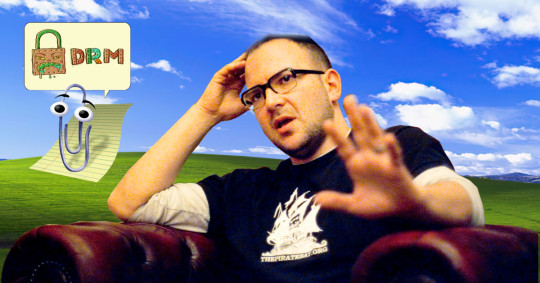
On THURSDAY (June 20) I'm live onstage in LOS ANGELES for a recording of the GO FACT YOURSELF podcast. On FRIDAY (June 21) I'm doing an ONLINE READING for the LOCUS AWARDS at 16hPT. On SATURDAY (June 22) I'll be in OAKLAND, CA for a panel and a keynote at the LOCUS AWARDS.

This week on my podcast,This week on my podcast, I read my June 17, 2004 Microsoft Research speech about DRM, a talk that went viral two decades ago, and reassess its legacy:
https://craphound.com/msftdrm.txt
It's been 20 years (and one day) since I gave that talk. It wasn't my first talk like that, but at the time, it was the most successful talk I'd ever given. I was still learning how to deliver a talk at the time, tinkering with different prose and delivery styles (to my eye, there's a lot of Bruce Sterling in that one, something that's still true today).
I learned to give talks by attending sf conventions and watching keynotes and panel presentations and taking mental notes. I was especially impressed with the oratory style of Harlan Ellison, whom I heard speak on numerous occasions, and by Judith Merril, who was a wonderful mentor to me and many other writers:
https://locusmag.com/2021/09/cory-doctorow-breaking-in/
I was also influenced by the speakers I'd heard at the many political rallies I'd attended and helped organize; from the speakers at the annual Labour Day parade to the anti-nuclear proliferation and pro-abortion rights marches I was very involved with. I also have vivid memories of the speeches that Helen Caldicott gave in Toronto when I was growing up, where I volunteered as an usher:
https://www.helencaldicott.com/
When I helped found a dotcom startup in the late 1990s, my partners and I decided that I'd do the onstage talking; we paid for a couple hours of speaker training from an expensive consultant in San Francisco. The only thing I remember from that session was the advice to look into the audience as much as possible, rather than reading from notes with my head down. Good advice, but kinda obvious.
The impetus for that training was my onstage presentation at the first O'Reilly P2P conference in 2001. I don't quite remember what I said there, but I remember that it made an impression on Tim O'Reilly, which meant a lot to me then (and now):
https://www.oreilly.com/pub/pr/844
I don't remember who invited me to give the talk at Microsoft Research that day, but I think it was probably Marc Smith, who was researching social media at the time by data-mining Usenet archives to understand social graphs. I think I timed the gig so that I could kill three birds with one stone: in addition to that talk, I attended (and maybe spoke at?) that year's Computers, Freedom and Privacy conference, and attended an early preview of the soon-to-launch Sci Fi Museum (now the Museum of Pop Culture). I got to meet Nichelle Nichols (and promptly embarrassed myself by getting tongue-tied and telling her how much I loved the vocals she did on her recording of the Star Wars theme, something I'm still hot around the ears over, though she was a pro and gently corrected me, "I think you mean Star *Trek"):
https://music.youtube.com/watch?v=4IiJUQSsxNw&list=OLAK5uy_lHUn58fbpceC3PrK2Xu9smBNBjR_-mAHQ
But the start of that trip was the talk at Microsoft Research; I'd been on the Microsoft campus before. That startup I did? Microsoft tried to buy us, which prompted our asshole VCs to cram the founders and steal our equity, which created so much acrimony that the Microsoft deal fell through. I was pretty bitter at the time, but in retrospect, I really dodged a bullet �� for one thing, the deal involved my going to work for Microsoft as a DRM evangelist. I mean, talk about the road not taken!
This was my first time back at Microsoft as an EFF employee. There was some pre-show meet-and-greet-type stuff, and then I was shown into a packed conference room where I gave my talk and had a lively (and generally friendly) Q&A. MSR was – and is – the woolier side of Microsoft, where all kinds of interesting people did all kinds of great research.
Indeed, almost every Microsoft employee I've ever met was a good and talented person doing the best work they could. The fact that Microsoft produces such a consistent stream of garbage products and crooked business practices is an important testament to the way that a rotten organization can be so much less than the sum of its parts.
I'm a fully paid up subscriber to Ronald Coase's "Theory of the Firm" (not so much his other views):
https://en.wikipedia.org/wiki/Theory_of_the_firm
Coase says the reason institutions exist is to enable people to work together with lowered "coordination costs." In other words, if you and I are going to knit a sweater together, we're going to need to figure out how to make sure that we're not both making the left sleeve. Creating an institution – the Mafia, the Catholic Church, Microsoft, a company, a co-op, a committee that puts on a regional science fiction con – is all about minimizing those costs.
As Yochai Benkler pointed out in 2002, the coolest and most transformative thing about the internet is that it let us do more complex collective work with smaller and less structured institutions:
https://www.benkler.org/CoasesPenguin.PDF
That was the initial prompt for my novel Walkaway, which asked, "What if we could build luxury hotels and even space programs with the kind of (relatively) lightweight institutional overheads associated with Wikipedia and the Linux kernel?"
https://crookedtimber.org/2017/05/10/coases-spectre/
So the structure of institutions is really important. At the same time, I'm skeptical of the idea that there are "good companies" and "bad companies." Small businesses, family businesses, and other firms that aren't exposed to the finance sector can reflect their leaders' personalities, but it's a huge mistake to ascribe personalities to the companies themselves.
That's how you get foolish ideas like "Apple is a good company because they embrace paid service and Google is a bad company because they make money from surveillance." Apple will spy on you, too, if they can:
https://pluralistic.net/2022/11/14/luxury-surveillance/#liar-liar
Disney and Fox weren't Romeo and Juliet, star-crossed lovers making goo-goo eyes at each other across the table at MPA meetings. They were two giant public companies, and any differences between them were irrelevancies and marketing myths:
https://locusmag.com/2021/07/cory-doctorow-tech-monopolies-and-the-insufficient-necessity-of-interoperability/
I think senior management's personalities do matter (see, for example, the destruction of Boeing after it was colonized by sociopaths from McDonnell Douglas), but the influence of those personalities is much less important than the constraints that competition and regulation impose on companies. In other words, an asshole can run a company that delivers good products at fair prices under ethical conditions – provided that failing to do so will cost more in lost business and fines than they stand to make by cheating:
https://pluralistic.net/2024/05/24/record-scratch/#autoenshittification
Microsoft is a company founded and run by colossal assholes. Bill Gates is a monster and he surrounded himself with monsters, and they hired monsters to fill out the courts of their corporate palaces:
https://pluralistic.net/2024/06/14/patch-tuesday/#fool-me-twice-we-dont-get-fooled-again
To the extent that good things come out of Microsoft – some of its games products, the odd piece of hardware, important papers from MSR – it's in spite of the leadership; it's the result of constraints imposed by competition and regulation – and that's why Microsoft pursued such an aggressive program of extinguishing its competitors and capturing its regulators.
In retrospect, I think one of my goals in that talk was to convince those people doing good work for a rotten institution to go elsewhere and do other things. Certainly, that's one of the goals I pursue in the talks I give today. At the time, some of Microsoft's highest-profile technologists were publicly resigning over the company's war on free/open source software, so it wasn't an unrealistic goal:
https://web.archive.org/web/20030214215639/http://synthesist.net/writing/onleavingms.html
What I did not expect what that publishing the talk on my site and blogging it on Boing Boing would spark a wave of public interest that would get its message in front of several orders of magnitude more people than I spoke to at Microsoft that day. Partly, that was because I released the talk into the public domain, using the brand-new Creative Commons Public Domain Declaration (which was later replaced with the CC0 mark, due to legal issues withBu its drafting):
https://web.archive.org/web/20100223035835/http://creativecommons.org/licenses/publicdomain/
Some mix of the content of the speech, the spirit of the moment, and the novelty of that wide open license sparked a ton of interest. Jason Kottke recorded an audio version that Andy Baio hosted:
https://kottke.org/04/06/cory-drm-talk
My brutalist ASCII transcript was quickly converted to beautiful HTML by Matt Haughey and Anil Dash:
https://web.archive.org/web/20040622235333/http://www.dashes.com/anil/stuff/doctorow-drm-ms.html
For people who needed a hardcopy, there was Patrick Berry's printer-friendly stylesheet:
https://patandkat.com/pat/weblog/mirror/cory-drm/doctorow-drm-ms.html
Multiple people recorded (and sold!) audio versions, and then there were all the fan translations, into Danish, French, Finnish, German, Hebrew, Hungarian, Italian, Japanese, Norwegian, Polish, Portuguese (both EU and Brazilian), Spanish and Swedish. I stayed in touch with some of those translators, and they helped me translate the position papers I wrote for UN WIPO meetings. Those papers were so effective that ratfuckers from the copyright lobby started to steal them and hide them in the UN toilets (!):
https://web.archive.org/web/20041119132831/https://www.eff.org/deeplinks/archives/002117.php
Re-reading the speech for my podcast on Sunday, I expected to be struck by the anachronisms in it, and there were a few of those to be sure. But far more clear was the common thread running from this talk to other talks I gave that took on a significant life of their own, like my 2011 "War On General Purpose Computing" talk for CCC:
https://memex.craphound.com/2012/01/10/lockdown-the-coming-war-on-general-purpose-computing/
And my work on Adversarial Interoperability:
https://www.eff.org/deeplinks/2019/10/adversarial-interoperability
And my most recent work, on enshittification:
https://pluralistic.net/2023/08/27/an-audacious-plan-to-halt-the-internets-enshittification-and-throw-it-into-reverse/
In other words, I've been saying the same thing – in different ways – for more than 20 years. That could be depressing, but I actually found it uplifting. Two decades ago, I was radicalized by a fear that the internet would be seized by corporations and governments and transformed into a system of surveillance and control. I found my way into a job at EFF, where I worked with colleagues across multiple disciplines – coders, lawyers and activists – to fight this force.
At the time, this was a fringe cause. Most of the traditional activists I'd come up with in the feminist, antiwar, antiracist, environmental and labour movement viewed digital rights as a distraction and dismissed its partisans as sad, self-obsessed nerds who mistook fights over the management of Star Trek message boards for civil rights struggles:
https://www.newyorker.com/magazine/2010/10/04/small-change-malcolm-gladwell
I thought I was right then, and I think history has borne me out. The point of waging these fights – both in the wide public sphere and within political movements – is to get people activated before it's too late. Every day that goes by is a day when the internet becomes more inhospitable to political organizing for a better world – more surveillant, more controlling. I believed then – and believe today – that the internet isn't more important that the other fights I waged as a young activist, but I think that the internet is fundamental to those fights.
Saving the planet, smashing patriarchy, overthrowing tyranny and freeing labor are all fights that will be coordinated – Coase style – on the internet. Without a free, fair and open internet, those fights are infinitely harder to win.
The project of getting people to understand, care about, and fight for digital rights is a marathon, not a sprint. When I joined EFF, it was already 12 years old. There were six people in the org then (I was the seventh). Today, there's more than a hundred of us, and we're stretched so thin! The 30+ year old idea that internet policy will intersect with every part of every fight has been utterly vindicated.
Back in 2004, I asked Microsoft why they were willing to fight the US government to the death over antitrust enforcement, but were such wimps when confronted with the entertainment industry's demands for DRM. 20 years later, I think I know the answer: Microsoft understood that DRM would let them usurp the relationship between creative workers, entertainment industry companies, and audiences. Their perfect instincts for seeking out and capitalizing on opportunities to seize monopoly power drove them to make deliberately defective products, in the belief that their market power would let them cram those products down our throats:
https://memex.craphound.com/2004/01/27/protect-your-investment-buy-open/
Here's a link to the podcast episode:
https://craphound.com/news/2024/06/16/my-2004-microsoft-drm-talk/
And here's direct link to the MP3 (hosting courtesy of the Internet Archive; they'll host your stuff for free forever):
https://archive.org/download/Cory_Doctorow_Podcast_470/Cory_Doctorow_Podcast_470_-_My_2004_Microsoft_DRM_Talk.mp3
And here's the RSS feed for my podcast:
https://feeds.feedburner.com/doctorow_podcast

If you'd like an essay-formatted version of this post to read or share, here's a link to it on pluralistic.net, my surveillance-free, ad-free, tracker-free blog:
https://pluralistic.net/2024/06/18/greetings-fellow-pirates/#arrrrrrrrrr
#pluralistic#drm#enshittification#microsoft#microsoft research#podcasts#mp3s#history#trusted computing#ngscb#retrospectives
284 notes
·
View notes
Text
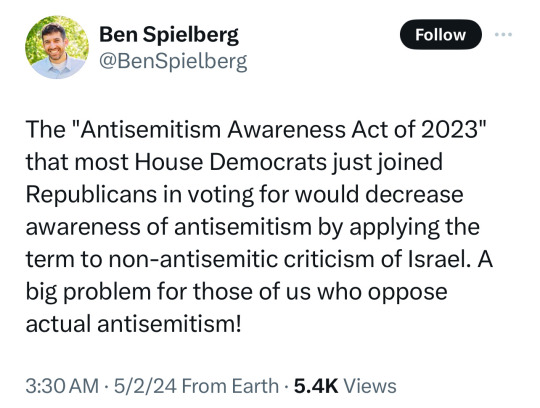
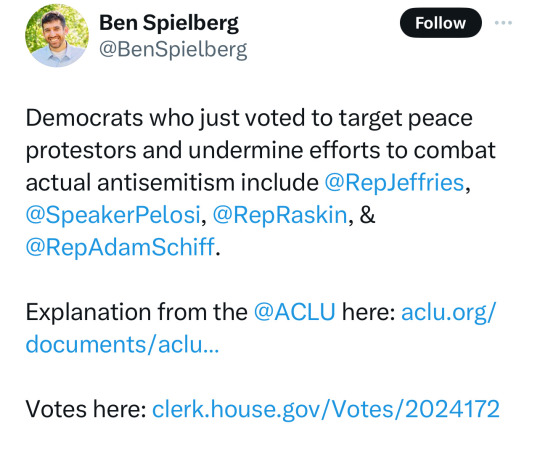
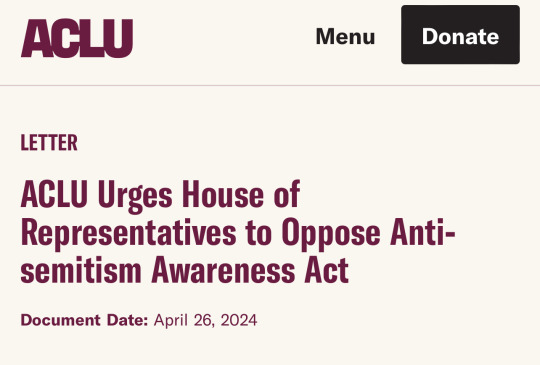
“First, H.R. 6090 could result in colleges and universities suppressing a wide variety of speech critical of Israel or in support of Palestinian rights in an effort to avoid investigations by the Department and the potential loss of funding, even where such speech is protected and does not qualify as harassment. Even without H.R. 6090, advocacy groups have already filed or threatened to file numerous Title VI complaints and lawsuits, alleging that colleges have violated Title VI merely by condoning Palestinian rights groups, events, and advocacy. For example, in September 2023, the pro-Israel group Santa Fe Middle East Watch claimed that the University of New Mexico's anthropology department would violate the New Mexico Governor's executive order using this same definition of antisemitism if they hosted Mohammed El-Kurd, a Palestinian poet and writer currently serving as the Nation's Palestine correspondent.
Moreover, in February 2020, the David Horowitz Freedom Center sent a letter to Pomona and Pitzer college officials alleging “the colleges’ liability under Title VI” for, among other things, co-sponsoring a Students for Justice in Palestine event featuring a screening of the film ‘Gaza Fights for Freedom,’ and funding a panel on “Perspectives on Colleges and the Israeli-Palestinian Conflict.”
Additionally, there have been multiple instances of university censorship of pro-Palestinian expression after the October 7 Hamas attack on Israel. These include the University of Pennsylvania denying a screening of a documentary which raises concerns some young Jews have about Israel's treatment of Palestinians, and Brandeis University banning the student group Students for Justice in Palestine.* Equating criticism of Israel with antisemitism by law, under a threat of investigation, will only create more fear in schools, prompting administrators to silence this speech regardless of whether it is protected.
Second, even where administrators do not take formal action, students and their organizations, faculty, and university staff may be deterred from speaking and organizing on these issues. Activists would be understandably hesitant to engage in political expression criticizing Israel or advocating for Palestinian rights if they have reason to believe the federal government will actively investigate such expression in connection with harassment complaints and investigations.
Finally, the bill would likely inspire an increasing number of complaints focused on constitutionally protected criticism of Israel. These complaints will not only cause schools to limit speech out of fear, but will also force both the Department and covered universities to devote time and resources to addressing complaints about constitutionally protected speech, instead of meritorious harassment complaints.”
(source) (source)
#politics#palestine#israel#hr 6090#antisemitism awareness act#weaponized antisemitism#aclu#columbia university#campus protests#student protests#🇵🇸#censorship#bds#boycott divest sanction#hasbara#anti zionism ≠ antisemitism#zionism#israel is a terrorist state#idpol#weaponized identity politics
146 notes
·
View notes
Note
Gregory Peck is not only a certified hunk of a man but a great actor and a genuinely good person.
He starred in the film version of the novel Gentleman’s Agreement which was “Hollywood’s first major attack on anti-semitism” which features Peck as a magazine writer who pretends to be Jewish so he can experience personally the hostility of bigots and then calls out and exposes antisemitism and this film was made in 1947 like only two years after the end of World War II so historically an important film(I love this film and think its underated like its great and like Greg looks amazing as he rails against bigots). I could make an argument, and I have honeslty thought about writing a paper on it, that a majority of his films tackle some important issue whether it be antisemitism (Gentleman’s Agreement), racism (To Kill a Monckingbird), nuclear war (On the Beach), post-war discontent and PTSD (The Man in the Gray Flannel Suit), the futility of war (Pork Chop Hill) etc.
His daughter Cecilia said “ My father was a champion of stories that needed to be told, like To Kill a Mockingbird, Gentleman’s Agreement, and On the Beach. He was not afraid of films that championed diversity, equality, and tolerance. He was deeply intelligent, and also very funny in real life.”
He was against the House Un-American Activities Committee and their investigation of “alleged communists” in the film industry and signed a letter deploring their actions in 1947. He was outspoken against the Vietnam War, while at the same time supportive of his son who was fighting there. He produced the film version of the play The Trial of the Catonsville Nine about the prosecution of a group of Vietnam protestors for civil disobedience. Peck said “I decided to make the film because the play confirmed my thinking that the Vietnam War [was] an abomination.” His outspoken-ness against the Vietnam war and general political activism put him on Nixon’s “enemies list” (honestly what an icon).
He was a vocal supporter of a worldwide ban on nuclear weapons and was a lifelong advocate for gun control.
He and his wife Veronique often hosted dinners at their home in support of the arts and humanitatian or social justice causes. His daughter
He was Catholic but took a pro-choice stance on abortion and supported gay rights.
He was the president of the Academy of Motion Pictures Arts and Sciences (1967-1970) and postponed the awards following the assasination of MLK.
He was honored with the Presidential Medal of Freedom in 1969 for his lifetime humanitarian efforts and he also won the Jean Hersolt Humanitarian Award.
He didnt just play the handsome hero on the big screen he was one in real life.
Now some photos of him looking good:




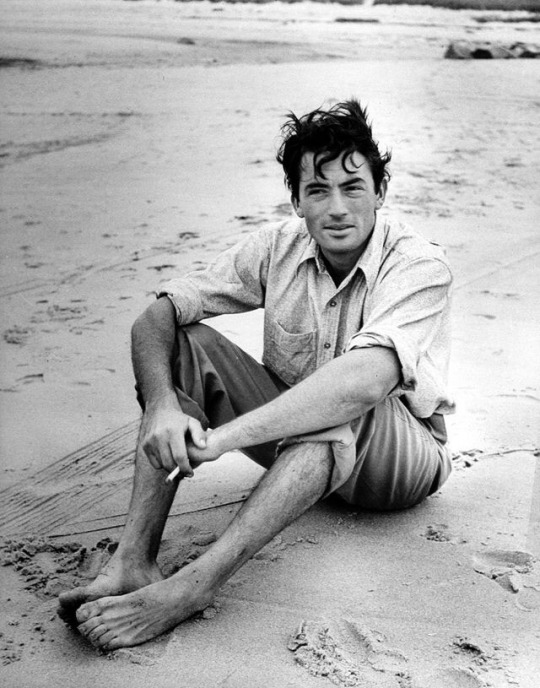

Gregory Peck vs Paul Robeson
160 notes
·
View notes
Text
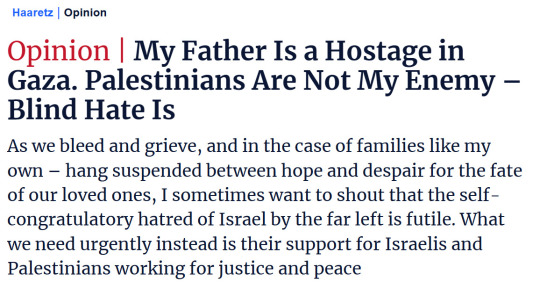
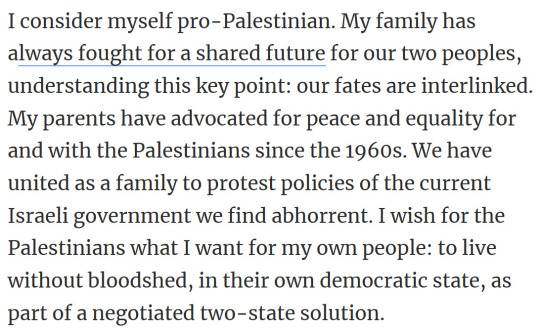
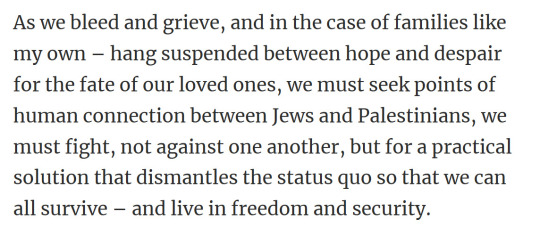
A highly recommended read. Full text of article under cut
On October 7, I was not hiding with my child in the safe room. My house was not burnt to the ground, and my husband didn't blow me a last kiss before his killer fired a fatal bullet.
I was safely at home in London where I have lived for over 30 years when my elderly peace-activist parents, Oded and Yocheved Lifschitz, along with 77 others members of the community, were taken hostage, barefoot and in their pajamas from their homes in the kibbutz where I was born and raised.
Israel's hostages in Gaza: A matter of life and death
Israeli peace activists who lost loved ones in the Hamas massacre stand their ground
What we can learn from released Hamas hostage Yocheved Lifshitz
For the past 229 days, together with the families of the other of hostages taken captive which now number 128, we have taken part in the fight for the lives of our loved ones.
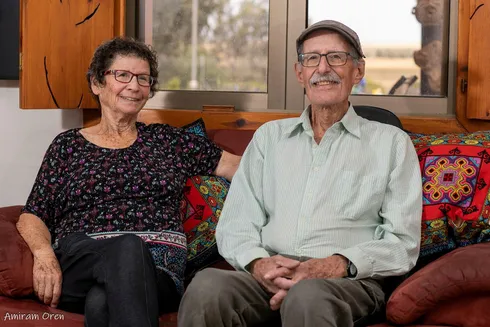
A photo of the writer, Sharone Lifschitz's parents, Yocheved and Oded Lifschitz, who were both kidnapped by Hamas to Gaza on October 7. To date, only Yocheved Lifschitz has returned. Credit: Amiram Oren
In Nir Oz, my family's kibbutz, one in four people (117 in total), were either executed or kidnapped. We are still piecing together the events of that brutal day that Hamas terrorists and some Gazan civilians, perpetrated medieval levels of cruelty, driven by hate and revenge, blinded by radical religious ideology and super-charged with amphetamines.
Last month, at the "Seder in the Streets" event in New York, activist Naomi Klein spoke as if none of that ever took place. Instead, addressing hundreds who gathered for a combination Passover Seder and protest of the war in Gaza, she spoke of what she termed the "False Idol of Zionism", comparing Jewish support of it to the Israelites "worshiping" the golden calf and recalling Moses' rage seeing the spectacle.
Klein's interpretation seems to miss the point: Moses, unlike Klein, did not disengage. He did not give up on his people when they worshipped a false idol. Instead, without compromising his integrity and beliefs, he guided them through the desert for forty more years in their journey to become a nation. Klein, at this dangerous moment in history, is failing to lead her listeners to take responsibility, to engage and work towards a shared future in the region for Jews and Palestinians, one built on the preciousness of life on both sides and an understanding of the original intention of Zionism: the necessity for a safe home for the Jewish people.
"Seder in the Street" was also protesting the heartbreaking and ongoing humanitarian crisis in Gaza and settler violence in the West Bank. Many in Israel, like my parents, would agree. Yet their plight and that of the other hostages – most of them civilians, from a baby boy of one year to a man of 86 - are not mentioned at Seder in the Streets or other gatherings of far-left pro-Palestinian Jewish activists.
My father, Oded Lifschitz, who is 83, and his friends who are also hostages, all in their late 70s and 80s, have worked for peace for decades. My mother, Yocheved Lifschitz, was thankfully released after 17 days of captivity.

Yocheved Lifschitz after being released from 17 days in Hamas captivity, in Tel Aviv, Israel in late October. Credit: Tomer Appelbaum
How much more effective these protests could be if activists abroad could act as a bridge between the pro-Palestinian movement and progressives fighting for peace in Israel?
Hamas, a terrorist organization which has been systematically stripping freedom, women's rights and democracy from the Gaza strip since 2006 are also strangely left out of the discussion. In fact, I see more criticism of the Hamas attack and crimes from moderate Palestinian voices than from prominent Jewish voices of the pro-Palestinian movement in the United States and Europe.
Klein is instead content in disengaging from Israel based on a distorted idea of Zionism and in so doing offers no solidarity with the moderate, progressive Jews living in Israel and for whom rejecting Zionism is irrelevant at this moment. Whether we like our government's policies or hate them as many do, Israel is home. Just as Canada is Klein's home, whether or not she likes the policies of the Canadian government or condones its mistreatment of its Indigenous population.
I consider myself pro-Palestinian. My family has always fought for a shared future for our two peoples, understanding this key point: our fates are interlinked. My parents have advocated for peace and equality for and with the Palestinians since the 1960s. We have united as a family to protest policies of the current Israeli government we find abhorrent. I wish for the Palestinians what I want for my own people: to live without bloodshed, in their own democratic state, as part of a negotiated two-state solution.
The facts are indisputable to Zionists and non-Zionists alike: There are about 7 million Jews and 7 million Palestinians living in Israel and the occupied Palestinian territories of the West Bank and Gaza. Jewish Israelis cannot be expected to reject the idea that they can and should have the right to live safely in Israel. Without Israel, where would they go?
Everyone who cares about what's best for the region must strengthen those who are working for a peaceful future. As my father always says, "You make peace with your enemies."

A Palestinian family rides on the back of a donkey-drawn carriage next to damaged buildings in Khan Yunis, in the southern Gaza Strip, in April.Credit: AFP
Thanks to international efforts to formulate a plan for the "day after" the war in Gaza, we are potentially closer to a long-term political agreement to lift us out of conflict than ever before. To help facilitate it, American and European progressives must distinguish between religious fanatics on both sides and those working toward a path of justice and peace for everyone in the region.
We must differentiate the liberal American pro-Palestinian activists from those who justify Hamas atrocities as acts of resistance. The dominant current narrative of the American far left, including the Jews among them, unwittingly aligns with Iran, and with antidemocratic and illiberal forces.
Instead of fostering hate and promoting disengagement from Israel, progressives abroad should help those in the region regain a sense that another future is possible and advocate for a negotiated political agreement that would create a state of Palestine established alongside the state of Israel. It won't be perfect, but it will be a good start.
The work of advocating for a different, sustainable future, must start with a call for the immediate release of hostages as part of a long-term agreement, backed by America and its allies, including moderate Arab states, that has the potential to transform the lives of Palestinians and Israelis by rescuing them from this ongoing tragedy. To fail to do so is to fail not just the hostages and their families, but to throw all the people of the region further into the abyss and undo the inspiring work of moderate forces within Israeli and Palestinian society.
In this, our darkest hour, we ask ourselves, who is our enemy? My enemy is the blind hate that seeks to erase the humanity of the other side. All of us who are horrified by what is unfolding in Gaza should work toward empowering the people of the region to move away from our common enemy. That's not Zionism, but rather the religious fanaticism we have within both our societies – Israeli and Palestinian – that threatens to engulf us all.
Sometimes, I want to shout at the news on TV, to remind people that their indulgent engagement in hatred of one side is so futile, so self-congratulatory. We can do better.
As we bleed and grieve, and in the case of families like my own – hang suspended between hope and despair for the fate of our loved ones, we must seek points of human connection between Jews and Palestinians, we must fight, not against one another, but for a practical solution that dismantles the status quo so that we can all survive – and live in freedom and security.
Sharone Lifschitz is a London-based filmmaker and academic originally from Kibbutz Nir Oz, whose parents were taken hostage on October 7. On Twitter: @Lifschitz_sha
#israel/palestine#Israel#palestine#hamas#israel hamas war#israel/hamas war#gaza#current events#october 7#hostages#hamas massacre#Simchat Torah massacre#10/7#I/p#hamas hostages#bring them home now#israeli hostages#israel gaza war#israel palestine war#israel palestine conflict#antisemitism#Jumblr#campus protests#pro palestine#Istg tagging this was so difficult there’s like 80 different names/notations used for this conflict
130 notes
·
View notes
Note
hi! i just want to clarify first of all that im pro palestine, but a lot of people in my life aren't. ive been looking for ways to convince them but tbh im kind of lost. ive tried showing reports from websites like al jazeera but that's been dismissed out of hand because they're a middle east jounral and thus must be biased (pointing out that stuff like cnn then must be biased too because they're american hasn't worked lol). so, do you know of more "unbiased" resources/journals/etc, or anything that can argue for palestine? sorry if this is badly worded its pretty late. appreciate everything you've done btw 🇵🇸
No worries, I totally understand where you're coming from.
I guess I wanna ask for clarification—do you know what resources they personally are willing to accept? I can provide from Jewish scholars/voices if that'll help.
The issue is, not many USAmerican/European sources are unbiased, and they often spout imperialist propaganda. So if they're looking primarily for those types resources, I'm afraid I cannot really give you too many.
Here's a segment from an Angela Davis interview from Democracy Now that I like: https://www.democracynow.org/2021/12/28/angela_davis_25th_anniversary_taped_segment
Also her book Freedom Is a Constant Struggle: Ferguson, Palestine, and the Foundations of a Movement: https://www.amazon.com/Freedom-Constant-Struggle-Palestine-Foundations/dp/1608465640
Angela Davis is often pretty vocal about the harms of imperialism throughout the world and specifically mentions Palestine in her activism. I suggest looking to her writings also.
Can't say I know too much about DemocracyNow! though.
Some other scholars/orgs are:
Jewish Voice For Peace: https://www.jewishvoiceforpeace.org/
If Not Now: https://www.ifnotnowmovement.org/
Ilan Pappe (he's specifically "Israeli", if that will help at all)
Frank Barat
Noam Chomsky: https://chomsky.info/
Modoweiss: https://mondoweiss.net/ Now I don't totally love Mondoweiss all of the time but if the people in your life are really against learning from non-Palestinian sources they might be ok to introduce them. They do have Palestinian writers and editors tho.
I guess if its more that they're unwilling to trust SWANA news sources, you could show them The Institute for Palestine Studies, which is associated with Columbia University.
This list was a little difficult because I can't say I'd always recommend these sources (except, well, Angela Davis—I really look up to her—and Institute for Palestine Studies), but it could be a good introduction if they're rejecting other places that have more reliable reporting. If they're willing to accept these places/people, then you could move on to more Palestinian led sources.
I don't know if this helps, but you could say that they should listen to the Palestinian's POV because you'd always asked the people directly involved in a situation what their viewpoint is? Might help shift their understanding.
There are more sources that I thought about adding, but I need to look into them a little more. I might add on to this list later.
Let me know if any of this helps at all or even if it didn't, I'm genuinely really interested to see what they have to say.
192 notes
·
View notes
Text
I wish Pinkie Pie was the star of my story right now, but she's not. She's a background character, comes in every now and then when she's needed most, but it's going to be a few arcs before she can be even a main character in our story.
Right now the story centers around someone unremarkable who isn't strong or proud to be themselves and has a long way to go before they love themselves. It's a slow story and drags on for some time, most would stop watching before it gets to the good part. The story is about someone who wishes they were Pinkie Pie.
Our writers know what the story will one day be, they'll know that it'll become about Pinkie Pie but they know it'll be a journey the audience will have to sit through first. The future for the show will be incredible, it'll bring tears of laughter and smiles of blissful joy. They know it'll be worth the wait.
Thank you to everyone who follows me, reblogs and likes my posts and supports me. We are still suffering a lot and the road to recovery is full of thorns. One day we will no longer depend on our abuser and finally feel what freedom is like again. And on that day Pinkie Pie will finally become the main character of our life.
Thank you for sticking with us.

[IMAGE ID: ponyville is a (pro) endo free zone break dni and get blocked loser! END ID]
#did system#did#endos dni#did osdd#system#actually did#actually plural#osdd system#osdd#syspunk#systempunk#pluralpunk#cdd#cdd system#cdd community#actually cdd#polyfrag
22 notes
·
View notes
Text
the australian government is trying to legislate kids under sixteen off of social media. so, if you are aussie and under sixteen, you won’t be allowed to have a sm account on sites like twitter, tiktok, facebook, youtube—and more.
i know our relationship with minors, as fic writers who write for other adults, is rocky at best. the rise in self-censoring and shame-based attitudes among readers in general is helping to kill any and all artistic curiosity in the next generation, which in turn makes it actively hard to be in shared, online fan spaces. it’s easy to blame the kids, but at its heart i think this is an active adult failure. our younger generations have gotten the raw end of the deal, in many ways; one of them being allowed to grow up alongside of material that they should’ve never had free access to, not without guided parenting.
And that’s the thing. the answer isn’t banning them. the legislation involved means that social media companies will be the ones to face the penalties (the fines) if minors break the new laws. which means—what? censorship gets even worse, in an effort to be even more kid friendly? Government-interest friendly? this talk started happening in the thick of the pro-palestine marches, as the movement was trickling into universities and highschools. And okay, let’s say it’s not that—what else could this be about? could it maybe have something to do with the fact that the australian government wants to implement a Digital ID nation wide?
"This one is for the mums and dads,” Albo, Anthony Albanese, our prime minister and prime dickhead, says in the announcement. “They, like me, are worried sick about the safety of our kids online. I want Australian families to know that the government has your back.”
But this isn’t about protecting kids. At the very best, they’re selling it as a scapegoat—like, oh! Haha, now you can just tell the kids it’s illegal!! It completely ignores the reality that people have to parent these humans. Like, it’s giving people, at best, an excuse to continue being lazy. They don’t have to sit down with their kids and the things they’re engaging with, anymore—because they’re banned from it! Instead having conversations about the media they encounter, it’s okay! You don’t need to worry about that anymore! The australian government wants to pretend this is about protecting kids from predators or online bullying, instead of parents confronting the fact they’ve created little assholes with unfettered access to tools to harass people with, or let their kids walk into traps because they haven’t taught them basic internet safety.
I have mixed feelings. Like any other (reasonable) adult, I worry about what kind of effects this much freedom to this much knowledge and drivel and personality can do to someone younger, someone who hasn’t like—had to learn how to make their way through a world where people are messy and a little weird and sometimes outright unlikable, but you have to still be professional about it, you know? I worry about things like micro-trends running the fun and excitement of digging in and finding some niche fashion that becomes your personality. I worry about status symbols like the right makeup and fitness pants and waterbottles getting popular too fast, and then cycling out just as quickly and creating a pace that kids without means can’t participate in as fast. I worry about podcasts run by sigma-pus males or whatever, tradwives selling glamour under the pretense of housework, like, so much of it. But these are all things that you as a parent have to negate!!! Like. You can’t just ban kids from the internet and then expect them to be normal about things whenever they’re allowed back—you have to teach them to be, to handle it. You have to teach them!!
I am saying this as an adult. An adult who likes adult things, and likes them in an open, easily-accessible space. An adult who would actively benefit from minor-free social media. There are things as an adult creator that I wanna talk about, or write about, in ways that aren’t always age-appropriate (or at all!!) for a younger audience. And look—my personal view has always been that as a fanfic writer, my responsibility to you guys (adults and sneaky-little-minors alike!!) has always been to warn appropriately on or in the fics themselves. That’s it. You get the warning labels on the tin, and you decide what to do with that afterwards. It’s not always perfect because I’m not perfect. I will make mistakes. I might not tag for something specific that ends up being a trigger for you. But the thing with fanfiction and fanfic communities is that we generally have to trust each other. I might miss a warning, but you have to trust that that mistake wasn’t a deliberate effort to hurt you. I have to trust that you guys know your own boundaries and will engage—or not!!—accordingly. I opt to treat my space here, my blog, as an open-one. Because it is! It’s a public blog LOL. If you have a tumblr account, then you have access to it! So, I try to treat this space like a public conversation in a café, or a foodcourt. Maybe I slip a raunchy little book over the table to you, and we make one or two rude jokes, or otherwise a stray rando catches the tail-end of a more serious conversation—but it’s all things I would be comfortable (enough) discussing with someone in a space where maybe I don’t know everyone involved, you know? I benefit from the knowledge that oh well, at least I don’t have to worry about local kids getting on here. 💀 But—I hate that for them!! Do I trust younger readers? Not always!!! I worry that they’ll get caught in the wrong feedback loop, that they don’t like, investigate claims or challenge information for themselves, that they’ve never had to! And hey, to be completely fair, I don’t always trust proper adult readers with that either LMFAOOO, but the point is that kids get more grace and more worry from me because they are still actively learning to be apart of things, of communities. And I think banning them from that is ultimately a mistake. To protect someone you have to teach them what to look out for, how to engage safely, how to trust themselves. And that’s not what’s going to be achieved here. This social media ban is a useless bandaid in the face of bigger problems (housing crisis, inflation, the AUKUS submarine thing i don’t even want to talk about it its stupid) that the government is waving around to distract everyone with. And it’s working. Because people would rather sit there and scroll on facebook, or whatever, instagram, instead of actively parenting.
#it makes me big mad bc my mum was like—probably my biggest champion when it came to reading#like she wouldn’t ban me from reading certain books. if i ever picked up something she had concerns about we would talk about it together.#and yeah that’s different from actively being on social media BUT a lot of what i learnt through her trust in that carried over to how i —#—engaged with the internet as an older kid and teenager and young adult#anyways i think it’s a slippery slope !!!!!!! fuck all governments they’re all evil#things like this seem bengin or even helpful but they only serve to tighten the noose around us all further!!!!!
29 notes
·
View notes
Text
My favorite Yandere Types
Author's note: I will spare you the sob story and just say that my uncle needed my help right after he got out the hospital. It wrecked my scheduling and I already promised that I would do better with posting more frequently, so I did another ramble post. These classifications aren't polished in any way. I just spouted whatever comes to mind. Enjoy!
Note #2: Sorry if the pic for Laidback Yan is blurry. I'll figure out how to do memes better next time. Also, all the yanderes listed are male yandere because that's my personal favorite.
Sugar Daddies

Kind of a "money comes at a price" thing I always love.
Pro: Spoils you.
Con: Thinks he owns your life.
Personally, I'm not a fan of the 'I'll isolate you' types. In fact, I think it'll be cooler to see a yandere use darling's loved ones to his advantage, such as "How desperate are you to get your sister into that art school?" and "It would be a shame if your brother doesn't have that dream job. I'm sure you'd do ANYTHING to make that happen if you could, right?"
Sadist/Psycho

He wakes up and chooses violence. Just an absolute menace to society. You'd have to make bad choices in your life to have him obsessed with you. I love this one, because writers can be very creative on how they act towards darling and towards the world. Typically their MO is "I wont hesitate to beat and shoot people. Not even you, darling! You just get it less."
Femboy/Otouto

My love for this is clearly inspired by Narancia (JJBA) and Bachira (Blue Lock). It's a guy who's naive, hyper, sweet, just so adorable that he'll have you thinking he's non-threatening. Then, the yanderu comes out and shows you just how dangerous and manipulative he can be. Also, he will get aggressive when you try slipping from him. I imagine this type always using overt guilt tripping.
Mr.Hades

Emo boy kidnaps a ball of sunshine to cure his lonely depression, such as Hades taking Persephone. There's not much else to say since this shipping dynamic (brooding x happy-go-lucky) is very popular.
Laidback
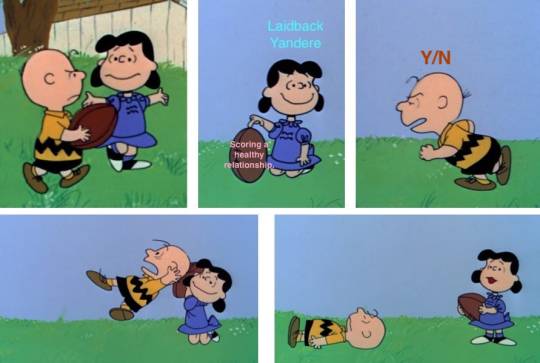
The laidback yandere that dont seem Yandere at all. He's super chill, actually gives you freedoms, and seems alright letting you socialize with people. What's the issue? Seems like a normal boyfriend! That's why I love them! So where does the Yanderu part comes in? In many different ways! Usually, in the form of a blackmailer or a tracker. It's easy to let you do what you want when you're never really that far from him or he has you fearing the consequence enough to trust you'll come back to him willingly. Honestly, I might do my own post on laidback yanderes.
#yandere#yandere x darling#yandere x y/n#yandere x reader#male yandere#male yandere x reader#ramblings#rough draft#dark content#dark romance#yandere types#yandere theory
221 notes
·
View notes
Text
Staying Motivated During Camp NaNoWriMo: A Writer's Guide to Success (As I Continue to Fail)
As a writer, you've likely heard of National Novel Writing Month (NaNoWriMo), the annual November challenge where participants aim to write a 50,000-word novel in just 30 days. But did you know that there's a more flexible version of this writing marathon called Camp NaNoWriMo? Held in April and July each year, Camp NaNoWriMo allows writers to set their own word count goals and work on any writing project they choose.
(Here's proof of me failing miserably to my writing goal 😭)

While Camp NaNoWriMo offers more freedom than its November counterpart, it can still be challenging to stay motivated throughout the month-long writing journey. As someone who's participated in multiple Camp NaNoWriMo sessions, I understand the ups and downs that come with this intensive writing experience. In this post, I'll share some tried-and-true strategies to help you stay motivated and reach your writing goals during Camp NaNoWriMo.
Set Realistic and Personalized Goals
One of the beauties of Camp NaNoWriMo is that you get to set your own goals. While this flexibility is fantastic, it's crucial to set realistic targets that challenge you without setting you up for failure. Consider your schedule, writing speed, and project type when determining your word count goal.
For instance, if you're working on a poetry collection, aiming for 50,000 words might not make sense. Instead, you could set a goal of writing 30 poems or spending 30 hours on your project. Remember, the goal is to make progress, not to burn yourself out.
Pro Tip: Break your monthly goal into daily or weekly targets. This makes the overall goal feel less daunting and gives you regular milestones to celebrate.
Create a Writing Schedule
Once you've set your goal, it's time to create a writing schedule that works for you. Consistency is key when it comes to making progress on your project. Try to allocate specific times each day for writing, even if it's just 30 minutes.
Consider your natural rhythms and responsibilities when crafting your schedule. Are you a morning person who can squeeze in an hour of writing before work? Or do you find your creativity peaks late at night after the kids are in bed? Whatever your situation, find pockets of time that you can dedicate to your writing.
Remember, it's okay if you can't write every single day. Life happens, and flexibility is important. The key is to have a general structure that you can fall back on.
Prepare Your Writing Space
Your environment can have a significant impact on your motivation and productivity. Before Camp NaNoWriMo begins, take some time to set up a comfortable and inspiring writing space. This could be a dedicated home office, a cozy corner of your living room, or even a favorite spot at your local coffee shop.
Ensure your writing area is clutter-free and equipped with everything you might need: your computer or notebook, reference materials, snacks, and a beverage of choice. Some writers find that having inspiring objects around them, like favorite books or meaningful trinkets, helps fuel their creativity.
Join a Writing Community
One of the most powerful aspects of Camp NaNoWriMo is the sense of community it fosters. Take advantage of this by joining a "cabin" - a small group of writers who can offer support, encouragement, and accountability throughout the month.
You can either join a random cabin or create one with friends. Engage with your cabin mates regularly, share your progress, and celebrate each other's successes. The camaraderie and shared experience can be incredibly motivating when the writing gets tough.
Beyond your cabin, participate in the wider Camp NaNoWriMo community through forums, social media, and local events (virtual or in-person). Surrounding yourself with other writers who are facing similar challenges can provide a much-needed boost of motivation.
Use Writing Prompts and Exercises
There will inevitably be days when the words just don't seem to flow. Instead of getting discouraged, have a arsenal of writing prompts and exercises ready to kickstart your creativity.
These can be simple character development exercises, dialogue prompts, or even free-writing sessions. The goal is to get your creative juices flowing and overcome any mental blocks you might be experiencing.
Pro Tip: Create a document or notebook filled with prompts and exercises before Camp NaNoWriMo begins. This way, you'll always have something to fall back on during tough writing days.
Reward Yourself for Milestones
Positive reinforcement can be a powerful motivator. Set up a system of rewards for reaching various milestones throughout the month. These can be small daily rewards, like a favorite snack after reaching your word count, or larger weekly rewards, such as a movie night or a long bath.
Don't forget to celebrate the big achievements too. Plan something special for when you reach your final Camp NaNoWriMo goal, whether it's buying a new book, treating yourself to a nice dinner, or simply taking a day off to relax and recharge.
Embrace the "Sprint" Mentality
Writing sprints - short, focused bursts of writing - can be incredibly effective during Camp NaNoWriMo. Not only do they help you make progress quickly, but they can also inject a sense of fun and urgency into your writing sessions.
Try setting a timer for 15-30 minutes and challenging yourself to write as much as possible during that time. Don't worry about editing or perfection; the goal is simply to get words on the page. You might be surprised at how much you can accomplish in these short, intense writing sessions.
Many writers find that alternating between sprints and short breaks helps maintain focus and prevents burnout. Experiment with different sprint lengths and break times to find what works best for you.
Keep a Progress Journal
Tracking your progress can be a great source of motivation. Consider keeping a journal where you record your daily word count, time spent writing, and any notable achievements or breakthroughs.
This journal can serve multiple purposes. First, it provides a visual representation of your progress, which can be encouraging on tough days. Second, it allows you to reflect on your writing process and identify patterns or areas for improvement. Lastly, it serves as a record of your Camp NaNoWriMo journey that you can look back on with pride.
Practice Self-Care
While Camp NaNoWriMo is an exciting challenge, it's important not to sacrifice your physical and mental well-being in pursuit of your writing goals. Remember to take care of yourself throughout the month.
This includes getting enough sleep, eating well, staying hydrated, and taking regular breaks to stretch and move your body. Don't forget to make time for other activities you enjoy, whether it's reading, spending time with loved ones, or pursuing other hobbies.
Taking care of yourself will not only help prevent burnout but will also keep your mind fresh and creative, ultimately benefiting your writing.
Embrace Imperfection
One of the biggest obstacles to motivation during Camp NaNoWriMo can be the pressure to write something "good." Remember, the goal of this challenge is to make progress on your project, not to produce a perfect, publication-ready manuscript.
Give yourself permission to write imperfectly. First drafts are meant to be messy, and that's okay. Focus on getting your ideas down on paper (or screen) and worry about refining them later. Some writers find it helpful to turn off their inner editor completely during the first draft, while others prefer to do light editing as they go. Find what works for you, but don't let the pursuit of perfection hinder your progress.
Have a Plan for When Motivation Dips
Even with all these strategies in place, there may be times when your motivation wanes. It's normal and happens to every writer at some point. The key is to have a plan for these moments.
This could involve reaching out to your cabin mates for encouragement, revisiting your favorite writing craft book for inspiration, or simply taking a short break to recharge. Sometimes, switching up your routine or writing environment can provide a fresh perspective and renewed motivation.
Remember why you started this journey in the first place. Reconnect with your passion for your story or project. Visualize how you'll feel when you reach your goal at the end of the month.
Reflect and Celebrate
As Camp NaNoWriMo draws to a close, take time to reflect on your journey. Regardless of whether you met your initial goal, you've likely made significant progress on your project and learned valuable lessons about your writing process.
Celebrate your achievements, no matter how small they may seem. Every word written is a step closer to completing your project. Be proud of the effort you've put in and the progress you've made.
Happy Writing! - Rin T.
Hey fellow writers! I'm super excited to share that I've just launched a Tumblr community. I'm inviting all of you to join my community. All you have to do is fill out this Google form, and I'll personally send you an invitation to join the Write Right Society on Tumblr! Can't wait to see your posts!
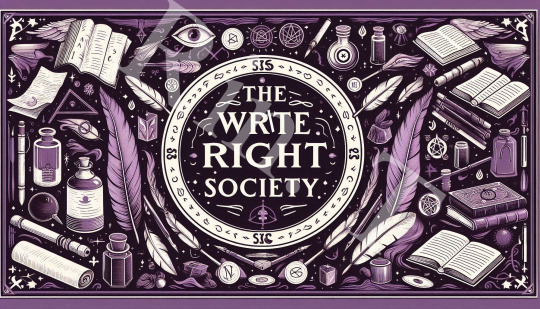
#writing#thewriteadviceforwriters#writeblr#creative writing#writing tips#on writing#writers block#how to write#writers and poets#writers on tumblr#novel writing#romance writing#writing a book#writing blog#writing characters#writing community#writing guide#writing advice#writing help#writing ideas#writing reference#writing resources#writing prompts#writing software#writing tools#writer#writer stuff#fiction writing#writing inspiration#novelwriting
47 notes
·
View notes
Text
Young Americans are more pro-Palestinian than their elders. Why?

Originally posted 12/23/23; updated 12/24/23
This is a thought provoking article about how different U.S. generations perceive the current conflict between Israel and Hamas. To encourage people to read the entire article, this is a gift 🎁link so that anyone can read the article, even if they do not subscribe to The Washington Post.
Although I am from an older U.S. generation, I condemn the Netanyahu administration's decision to pursue Hamas at the unconscionable expense of tens of thousands Palestinian civilians, including many children.
However, reading this article helped me to also understand why, being born in the decade after the Holocaust, I don't absolve Hamas of their terrifying behavior on Oct. 7th--unlike many younger people seem to have done. Although I strongly oppose the apartheid Israel has imposed on the Palestinians (and I do believe that Palestine should have been a free separate state long ago), I still don't think there is any justification for such a terrorist act against Israeli civilians.
I encourage you to read the entire article, but here are a few excerpts:
Across more than two months of war between Israel and Hamas, public opinion on the conflict has continuously shifted. But there has been a constant: a divide between the views of older and younger Americans that has shown up both during the war and in the years leading up to it. [...] Each age group has a different “generational memory” of Israel, Dov Waxman,director of the UCLA Younes and Soraya Nazarian Center for Israel Studies, said. Beliefs about the world tend to form in our late teens and early 20s and often don’t change, he said. Older generations, with a more visceral sense of the Holocaust, tend to see Israel as a vital refuge for the Jews, he said, and see its story as one of a people returning to safety in their homeland after living for 2,000 years as a scattered diaspora facing persistent persecution. In the decades after its founding, Israel was a relatively lower-income and vulnerable country. [...] But by the time millennials began forming their understanding of global events, the violence of the second Intifada had concluded in the mid-2000s with enhanced walls and barriers constructed between Israel and the West Bank, and then Gaza. This generation formed its idea of Israel from reports of Palestinians denied access to water, freedom of movement and fair trials, under the military control of what was by then a relatively rich, nuclear-armed power. “When I was in college it was the Oslo peace process, and I still remember that Israel — pursuing peace with the Palestinians and the hopes that came along with that,” Waxman said, of the ’90s. “Younger Americans have no memory of that.”
[See more excerpts from the article under the cut. Those excerpts are worth reading because they are quite thought provoking.]
A racial justice lens Joey Ayoub, a Palestinian-Lebanese writer, podcaster and academic, says young Americans are more likely to conceptualize the Palestinian cause as a sister issue to U.S. efforts for racial justice. There is a “visual parallel,” he said: of an armed soldier or police officer dominating a space inhabited by a populace with limited power, whether in a town in the occupied West Bank or a majority-Black neighborhood in the United States. [...] Eitan Hersh, a political science professor at Tufts University, said conflict between Israel and Palestinians seems to be seen by the young left, especially on college campuses, as “a people of color — that is, the Palestinians — rising up against a white oppressor,” though a significant portion of Israel’s Jewish population is of a non-European background. (Some are the descendants of about 850,000 Jews who were expelled from Arab countries and Iran after Israel was founded.) “It’s a bit of a curiosity,” he said. “One could tell an oppressor-oppressed story where the Jews, and Israel, is a story of the oppressed: kicked out of all these countries, going back to their homeland, surrounded by a broad set of dominant countries in the region that wants to destroy it.” Shifting demographics One explanation for the generational divide, experts said, was that fewer Gen Zers and millennials identify as conservative or Christian — demographics more likely to sympathize with Israel — than older groups. [...] Another “major factor” in older generations’ feelings toward Israel is their greater religiosity, according to Waxman. More than three-quarters of Americans 60-64 are Christian — with increasingly higher numbers for older brackets — compared with about half of adults under 30. “It’s, I think, for many religious Christians, somehow a kind of atonement in supporting Israel and Zionism,” Waxman added. “Genuinely, a feeling of Israel as a consequence of this long history of Jewish persecution” by Christians. Some Christians, particularly among evangelicals who are especially likely to sympathize with Israel, believe that Israel was promised to the Jews by God, and that the return of the Jews to Israel fulfills a biblical prophecy of the events that will precede the second coming of Jesus Christ. But even outside of this belief, the idea of Israel as a sacred land for Judeo-Christians has an emotional resonance that is simply not present for the increasing number of secular young Americans. [...] Social vs traditional media Dana El Kurd, a nonresident fellow at the Middle East Institute, said different types of media consumption have probably played a role in how people have formed their views on the Middle East. Americans 45 and older are most likely to get their news from TV networks and their websites, and Americans younger than 45 are most likely to get their news through social media, according to 2022 YouGov polling. The regular use of TikTok in particular is correlated with criticism of Israel, a New York Times/Siena poll found this week. Ayoub, whose interview podcast “The Fire These Times” with Lebanese, Palestinian, Syrian, Jewish, and Armenian perspectives has mostly Gen Z and millennial listeners, said that new forms of media facilitated access between content creators and consumers without “having a gatekeeper.” This has downsides, including “a huge uptick in misinformation” online, he said, but also positives, including allowing traditionally underrepresented groups to reach an audience. [...] “I’ll give an anecdote,” El Kurd said. “My students, when the war broke out, said that they had gone onto TikTok and toggled between the different locations,” to see what kind of videos were popular in Israel compared with Gaza, the West Bank and other places. “It had never occurred to me before to do that.”
I encourage people to read the entire article.
I am strongly opposed to the apartheid that Israel imposed on the Palestinian population. But being from an older generation, I am also less likely to wholly embrace some of the (in my opinion) more simplistic generalizations that younger generations claim regarding Israel.
For instance, many younger people assume most Israelis are predominantly of white European ancestry, but there is evidence that about half the Israeli population is not of white European descent, including those who always lived in the region, those from Ethiopia and Northern Africa, and the descendants of the 20th century expulsion of 850,000 Jews from other nations in the Middle East.
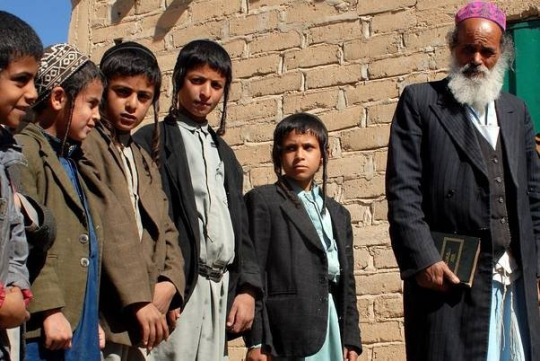

There are also some estimates that only 20% of the general gene pool in Israel is white European. This in turn leads to questions about the assumption of many younger people that white European Jews engaged in a "settler colonialism" of Israel. Still, some form of colonization DID happen, even if it might not fit a strict definition of "settler colonialism."
But it is important to remember that most of the Jewish colonizers around the time of Israel's founding were refugees who had survived the Holocaust, or were running from Eastern European pogroms/oppression, or who were expelled from Iran and Arab nations. What is tragic is that many of these Jewish victims of persecution and oppression and/or their descendants ended up implementing or supporting oppressive practices towards the Palestinians in their attempts to create a Jewish state where they could finally feel safe.
In many ways, all the nations of the world who oppressed and persecuted Jews for centuries have some responsibility for this mess. But that does not absolve the Israeli leaders from their oppressive choices towards Palestinians (especially their current choices that have resulted in the deaths of tens of thousands of Palestinian civilians)--just as Israeli oppressive behavior does not absolve Hamas leaders for their decisions to employ terrorist tactics against Israeli civilians on Oct. 7th.
Although I still support a two-state solution, I believe there are no easy fixes to this situation. The conflict, for both Israelis and Palestinians is an emotional powder keg fueled by thousands of years of transgenerational trauma (both within the region, and outside it in the case of the Jewish diaspora). This in turn affects the perceptions and responses of both Israelis and Palestinians. Sadly the current conflict has only added a new layer to the transgenerational trauma of both groups.
Anyway, after reading the above article, I realize that coming from an older generation, my perspective on the Israeli-Hamas conflict is different than the perspectives of some younger people. However, I still think there should be an immediate cease fire, and that the Biden administration should STOP supporting Israel, unless Israelis agree to end the fighting, fully support a rapid international humanitarian aid effort for the Palestinians in Gaza, come to the table to negotiate peace, and finally allow the creation of a free Palestinian state.
Originally posted 12/23/23; updated 12/24/23
#israel hamas conflict#generational differences in perception#israel#gaza#palestinians#frances vinell#the washington post#gift link
115 notes
·
View notes